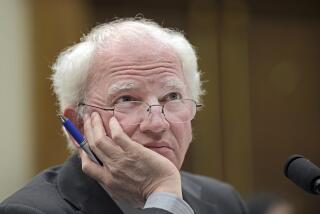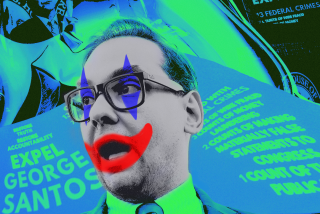Stephen Glass: From liar to lawyer?
- Share via
Has Stephen Glass, the serial fabricator who disgraced the New Republic magazine and inspired an entertaining indie film, reformed sufficiently to be allowed to practice law? We don’t profess to know the answer to that question, but if the state Supreme Court determines that he has mended his ways, it should allow him to hang up his shingle.
As anyone who has seen the movie “Shattered Glass” knows, Glass was a wunderkind in Washington journalism who in the 1990s produced stories that were too good to be true — literally. They included several pieces for the New Republic, most notoriously one about a church that worshiped George H.W. Bush, and a salacious profile of Washington super-lawyer Vernon Jordan that appeared in George magazine. Altogether Glass wrote 42 magazine articles that were wholly or partially fabricated. To allay suspicions about his work, he falsified notes and created a fake website and business cards. Eventually his deceptions were exposed.
Glass was never convicted of a crime and actually profited from his prevarication, earning $140,000 from a novel that fictionalized his fictionalizing activities. Forsaking journalism for the law, he graduated from the Georgetown Law Center, worked for two judges, passed the bar exam and applied for a California law license.
In California, applicants for the bar must receive a “positive moral character determination,” a finding that naturally is difficult to make with precision and perhaps should not be the bar’s purview at all. In 2009, the California bar denied Glass a license, but he won an appeal. The bar committee in charge of licensing has asked the California Supreme Court to block Glass’ certification as a lawyer, saying that he had not disclosed all his fabrications until his California application and had inaccurately told the New York bar he had helped all the magazines identify his falsehoods.
Now 39, Glass would be embarking on the practice of law relatively late in life and with a significant disadvantage: Even if the court accepts that he has been rehabilitated, some prospective clients will have their doubts. Glass’ license would always have an invisible “caveat emptor” attached to it. That Glass wants to pursue a legal career anyway is a testament to his determination.
And what of “moral character,” a term open to a bewildering variety of interpretations? The court will have to decide whether Glass has rehabilitated himself sufficiently to justify his admission to the bar. But in making that determination, the justices should be guided by a principle that should infuse the law in general: that redemption is possible and that those who have changed their ways are entitled to a second chance. Because Glass shattered one career doesn’t mean that he can’t aspire to another.
More to Read
A cure for the common opinion
Get thought-provoking perspectives with our weekly newsletter.
You may occasionally receive promotional content from the Los Angeles Times.









